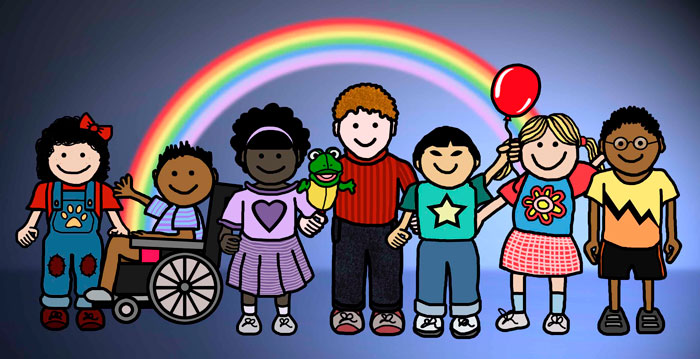Things to Never Say to a Special Needs Kid’s Parent
Parenting is an arduous business, as we all know only too well. It is even more cumbersome for special needs parents – not counting the fact that they often have to bear the additional brunt of comments that are judgmental. So it’s really advisable, when dealing with special needs parents, to know what you can say safely and what you had better avoid saying. One needs extra kindness not to break comfort of the kid and the parents alike.
Don’t always trust your good intentions
Even when you want to make a compliment to these people, the compliment may be based on your assumption that could be false or even offensive in a way. You don’t quite know how exactly you will sound, To be sure that you convey the same things you meant to say, take heed of these pieces of advice on conversing with a special needs parent by experts.
They are wonderful smart, aren’t they?
There are people who seem to take it for granted that kids with special needs are unable to study on a par with the common run of kids. But it is a very double-edged comment really, arrogating that if a child is, say, deaf, he or she is also obtuse. The bad implication is that a person partially limited is deficient in everything – which is impertinent when addressed to such children or their parents.
The thing to bear in mind is that an obvious incapacity doesn’t necessarily mean mental deficiency. Rather than indulge in misplaced compliments, you would do much better to inquire after the child’s favorite subjects and strong points, whether he or she takes to school well – in short, broach topics that can make the parent want to share information. Besides, you will be able to get a better insight into the life of this family.
They really look very normal
A special needs child may look different, on the other hand, he may not. You cannot go by looks with these kids. An autistic child will appear perfectly normal, just as children with dyspraxia and processing disorders will. So this kind of comment is meaningless.
It’s too bad, it’s a shame
Quite a number of people are at a loss what they can say to such parents, and they can respond with a glib phrase that doesn’t mean much like “It’s too bad” or “I’m sorry.” It can sound as though you feel that disability is something awful.
Pity is a feeling that should be abolished from the world of any special needs family. Take care to learn how they fare by inquiring – make your questions show that you take an interest in their life and are empathic.
Did something happen or is it an inborn deficiency?
What is wrong with the child is something their parents want to know down tot he smallest detail. They have been wondering over it for a long, long time, so this question may be perplexing or hurtful – or both. It might arouse guilty feelings, which is also better avoided.
He’s older than that, surely?
They may look older to be using diapers, or a pacifier, or a sippy cup, but development milestones in such families can be highly irregular, so this sort of comment is quite uncalled for (maybe even in more common-run families). Let children have their ways.
Can they read and write?
Like was mentioned before, parents know only too well the necessity to teach the child to read and write as early as it can be done. Yours would be just an overmuch remark they have heard before and might resent hearing it again.
You’re spoiling them
When special needs children act up, their parents often find themselves on the receiving end of sometimes offensive remarks from other people who criticize their bringing up. Since some of these children are not easily recognized as having special needs by appearance, people are apt tot hink they can be treated like everybody else.
Consequently their parents are blamed for the kids‘ misbehavior. But there’s no point in judging, while these children and their parents need support and understanding. Children, especially those with ADHD, are apt to have impulsive outbreaks, and you can help by displaying understanding and judicious attitude.
What made you go for a special needs child?
Some people adopt special needs kids. They shouldn’t be pestered with questions like why they chose a child with a disability or doubts whether they knew the child was like that from the beginning. Outside people don’t think that having a special needs kid brings a special kind of happiness into their lives. So, discussion of this point is better be on the sensitive side. Welcome would be remarks like: “You look as if you were made for each other.“
Do you know this or that therapy? I heard it is very good
You can rest assured that parents of children requiring special attention are doing their best to make their lives as comfortable as they can. This kind of comment carries an implication that the parents have omitted to do something useful for their kids and, consequentially, are not quite competent. Of course this can be construed as importunate; a much happier note can be introduced by imquiring after the kid’s progress and achievements.
Will you have to take care of them for all their lives?
Children are meant to turn into full-fledged adults and become independent individuals. Only it doesn’t always turn out this way. Either children or parents can require extra care or a related facility. This could become a development pregnant with troubles. See if you are prepared to handle this exigency.
Are all your kids burdened with this issue?
There are disabilities and disorders that come down in the family, while some spring up without any apparent predecessor. Some poor kids can be stricken with no warning. Either you know how the situation stands with a particulat family, or you don’t really need to inquire.
Before you ask anything: things to remember
Before you let your curiosity run away with you, pause and consider if your question, seemingly innocent, might probably be misconstrued and taken in bad grace. If you are on a good footing with the family, you will learn what you want to know in good time. Actually, it is the best way, so being patient and curb your interest may be a worthy policy.





